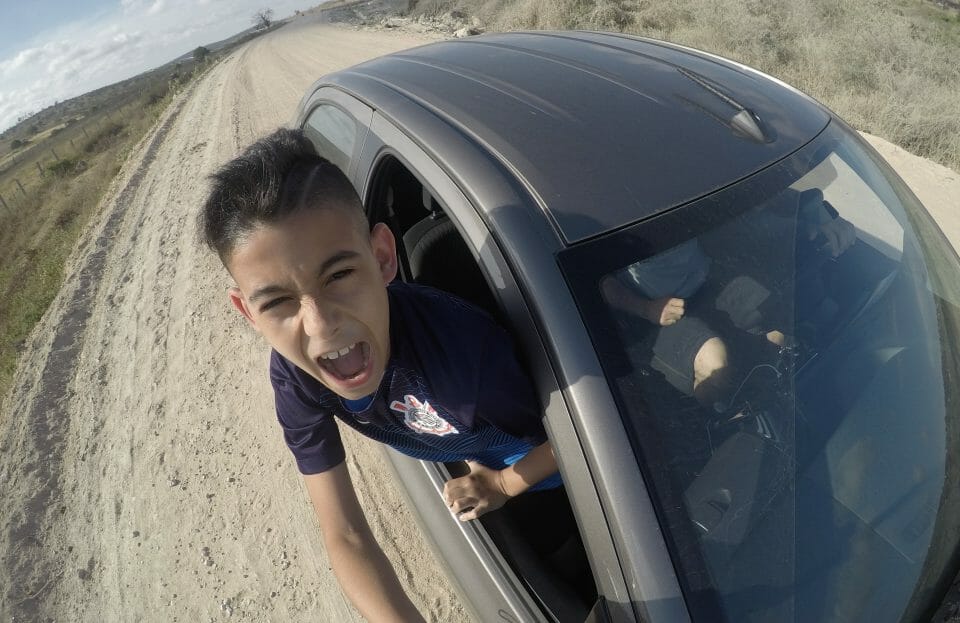
As parents, it’s natural for us to want to keep our children from feeling what we perceive as negative emotions. We want to keep them from suffering. But as hard as it is to admit, by doing so, we often do more harm than good.
Most people grow up thinking that our purpose in life is to avoid suffering. But it isn’t!
We aren’t supposed to avoid suffering, we’re supposed to manage it. We should never fight it, or even try to control it. We must live with it and find ways to use it to our advantage.
Emotions aren’t good or bad. They’re just signals our body sends us to help navigate the world safely. Our safety is a major goal for the subconscious mind. It may not always choose the perfect reaction, but it always chooses the one that seems the least risky and the most beneficial.
Think of negative emotions as stop signs or red traffic lights. They block us from moving forward, but would you ignore them, or destroy them, and keep going?
No, you wouldn’t. Doing this will likely get you into an accident.
The reason we try to get rid of “negative emotions” is that we grow up thinking they aren’t good for us. Over time, we get into the habit of avoiding them, instead of using them to guide us.

Why we can’t deal with negative emotions
It all starts when parents “interpret” babies’ crying as complaining. In fact, it’s simply their only method of communication. It’s their only way they can manipulate the world to get food, comfort, company, warmth or scratching an itch.
Without crying, babies would die.
Growing up, when your primary caregiver would say, “why are you crying?” and it sounded like “why are you complaining?”, you began to think of discomfort and vulnerability as a bad thing.
When we’re babies, we have the “cute factor”. Crying is excused, because we’re small and still learning about life.
But as we grow older, and the people around us start showing aggression or disappointment towards tears, we start to think crying isn’t good. Discomfort isn’t good. Loneliness isn’t good. Sadness isn’t good. Disappointment isn’t good.
Suddenly, all the signs that should help us navigate the world are no longer available to us.

It’s almost never on purpose, these things happen naturally. We get rewards for being happy and successful. And we get disciplined for being upset or vulnerable. Even if the reward is a smile and the punishment is a frown, they condition us.
While natural, it’s still not good for us. Some parents take it to the next level. For example, I remember my dad used to say, “Stop crying or I’ll give you something to cry about”.
Parents aren’t being mean when they say or do these things. They just feel helpless. They have low emotional intelligence. And by being unaware of their actions, they pass their suffering to their kids.
They try so hard to keep their kids from “suffering” that in a way, they cripple them.
Protecting an overweight son
I had a client whose teenage son was very overweight. Kids at school made fun of him all the time. So he was sad and miserable. Afraid of the company of others, he avoided going to school and started self-harming.
My client (his mom) spent weeks speaking to teachers, contacting the parents of the students who bullied her son and asking them to make sure the kids would stop being so nasty.
She was trying to protect her son from pain. Naturally, she loved him very much. She was just trying to help him. But by doing that, she crippled him.

Why?
Because it’s impossible to protect your children from being hurt by other people. People sometimes do unkind things. They sometimes say nasty things.
It’s much more effective to focus your parenting energy on helping your kids manage their emotions.
When the boy said, “I hate myself”, she said, “You don’t hate yourself”.
Then, when he said, “I’m fat”, she said, “You’re not fat”.
When he said, “This kid at school told me the elevator can’t carry me because I’m too big”, she said, “That kid was nasty”.
Then, when he said, “I don’t want to go to school”, she let him stay home.
During her parent coaching session, I asked her, “What will you do when he goes to college? What will you do when he starts working?”
She really did want to protect him. She was convinced she was doing the right thing because she loved him.
Always be true to your feelings because the more you deny what you feel, the stronger it becomes
Riya Kakkar
Emotional Intelligence (EQ)
EQ is the ability to:
- Recognize our emotions
- Manage our emotions
- Recognize others’ emotions
- Help others recognize and manage their emotions
How do you think we can have high emotional intelligence if we can’t even recognize how we feel?
That’s right! We can’t!

When anyone describes a feeling, especially a child, the first thing we need to do is listen to them and avoid trying to remove, contradict, deflect or fix the feeling.
Just let it be. In Buddhist therapy, one soaks in the feeling, until it dissolves on its own. If it isn’t gone, you haven’t felt it enough.
I know it’s hard when it’s your child. We want to save them that misery. But we have to let them express it, so they recognize what they are feeling. Without it, they won’t be able to develop the first step to emotional intelligence properly.
First, just listen

So, the first rule of helping kids face life is to let them say how they feel without feeling threatened. Without taking that emotion and asking yourself, “What does it say about me?” or “What will happen to them if they feel like that again?”.
We just need to listen and be there. Allow the negative emotions to exist. Allow the person expressing them to feel them until they understand what those feelings are trying to tell them.
You can do it by just nodding or saying occasionally, “Mmm”, “Aha” or “I understand”. Your calm and silence provides a safe space for them to occupy.
Encourage them to elaborate by asking, “OK, what else happened?” (wider) or “Tell me more about it” (deeper). It gives them a little more of what we all need to feel – heard!
Remember, your job isn’t to fix the problem, or to move the negative emotions away. Your job is just to be there, to listen and allow your child to manage their own feelings in a safe environment.
Fixing creates a dependency

For some kids, it can be a little different. They grow up with parents who fix their problems every time they feel sad or angry. So they don’t develop that level of self-managing.
As they get older, they depend on their listeners to fix their problems for them. And if the people in their life don’t listen, they become aggressive and blame them for the negative emotions.
This situation makes it very hard for parents to listen and negative emotions can escalate beyond where the challenge started. For example, a child who hits you because they are struggling to process something that happened at school is expressing negative emotions. But the way they communicate makes it difficult for you to be there and help them.
We can change the dynamic by following these rules.
Name it to tame it

Listen and reflect by giving the feeling a name. I believe we can’t get rid of a feeling completely this way, but if we know what we’re feeling, we can manage it better. Some kids just don’t have the vocabulary to express their negative emotions, so help them give their feeling a name.
Listen to the expression without trying to change it
Say things like “I see”, “I get it”, “ohhh”, “mmm”, “aaha” and “I understand”. Sometimes, just making “listening sounds” can do the job.
Make sure your eyes are focused on the child. Show them that you’re there for them and that you’re present by engaging with what they are expressing.
Be careful with “I understand”
If there are too many conflicts between you, the child might say, “No, you don’t understand”. So, don’t overuse this phrase. Convey the same idea with different words, like “I get it”, “I see” or without words, just by nodding your head in understanding.
This strategy is very good for situations where the child only wants to express themselves. You’ll notice their visible relief that someone is there to listen.
Sometimes, you can really help just by being with your child when they’re huffing and puffing or doing something else to ease the feeling.
Once, a student on the autistic spectrum in one of my leadership camps became very aggressive. While I cared for the 30 other students, the amazing chaplain, Robyn, managed to take him to the side. She just set next him without saying anything for over 25 minutes until he calmed down.
When he finally stood up, she asked him, “How are you feeling?” He said, “I’m good now”. And he re-joined the group.

She did nothing! No words, no punishment, no anger, no lectures. Just being with him was enough.
I saw her doing this with other kids too. It was amazing to watch. I swear she just sat next to them, sending vibes of love. Robyn’s strategy was to match the child’s body language and intensity.
With that in mind, make sure to match your child’s body language. If the child is expressing a feeling, ranked a 3/10, don’t respond with a 10. And vice versa, when the intensity is 10, don’t act like it’s nothing.
What NOT to say
Avoid saying, “Oh, it’s no big deal”, “Nothing serious happened” or “Stop making such a fuss”. These phrases diminish and belittle the feeling and don’t help the child process their emotions fully. It contributes to a future of struggling to manage negative emotions.

Photo by Marcelo Lima on Scopio
Don’t be tempted to ask, “What did you do that made that person say that to you?” that implies that you think their discomfort is their fault.
Abusive parents tell their children they’re the reason they are being punished, hit, violated and hurt. “I hit you because of something you did or didn’t do” is how they justify their abusive behavior.
When you tell kids their negative feeling is on them, you’re not helping.
Don’t be tempted to ask, “Why?” Don’t say, “Why are you sad?”, “Why did you play with him?” or “Why did you let them…” This devalues their feeling and the choices they’ve made. It can lead them to think they’re not allowed to feel sad or that they did something wrong to cause the conflict.
Don’t say, “I never want to hear you say things like that”. For kids, this translates to “You don’t care about me. You can’t help me. You’re the enemy.”
Saying things like that shifts the focus and leaves the child afraid to upset you. This won’t help them recognize and manage their negative emotions. It will only teach them to hide them from you. And when they hide, you can’t help them! Simple as that.
Don’t be tempted to agree with the child’s feelings. Saying things like “Oh, I agree. That was horrible. I’d feel the same if I were you” does more damage than good.
Emotions don’t need an approval. They need to be heard and acknowledged. If you use the words, “I agree”, you’re telling the child that your approval is important and necessary.
This backfires when you don’t agree with their feeling, which also happens. Feelings are there even if others don’t agree with us. We need to understand that as soon as possible. They are their feelings, not yours.
What to do after listening

After we’ve listened, what we need to do is help the child reframe the feeling. When they’re angry, aggressive or say something in frustration, say, “It seems like you’ve had a bad day at school today”, “I can see you’re frustrated”, “It looks like you’ve had an upsetting day” or “That must be frustrating”.
This allows them to recognize the feeling as “frustrated” or “upset”. Don’t take on the role of “fixer”. Don’t try to make the feeling go away.
You’re there to help your child recognize and manage the feeling on their own. If you talk to your child with that in mind, they won’t feel rushed to grow out of the feeling or push it aside.
When you reframe, don’t be tempted to repeat the child’s words. In regular conversation, repeating part of someone’s sentence can show you’re listening. But some kids don’t take it well when they’re upset.
It makes them feel you’re manipulating them and not really listening to their emotions. It makes them even more upset. For example, if they say, “I hate this teacher”, and you say, “Sounds like you hate the teacher”, it’s a sure-fire way to make them feel worse.
So, remember, “negative emotions aren’t bad for us”. We can use every feeling to navigate the world around us. Teach your kids to recognize their negative emotions by experiencing them, not by trying to get rid of them. If they don’t recognize them, they can’t manage them. This is the foundation of emotional intelligence.
Let feelings be felt, and hug your kids with grace and compassion!
Love,
Ronit











